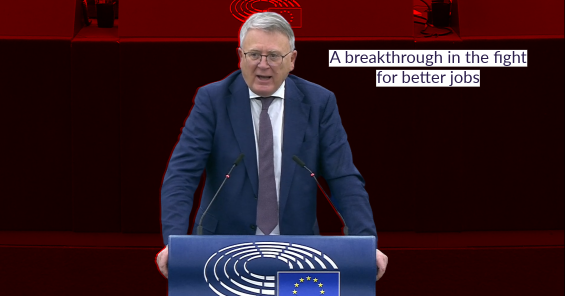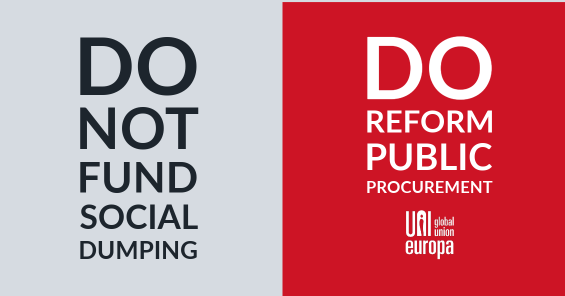Workers’ unions across Europe have launched a campaign for the EU to only give public contracts to companies that have collective bargaining agreements with their workers. Show your support here (in English). The action is also available in Bulgarian, Dutch, English, Finnish, French, German, Greek, Italian, Portuguese, Slovak, Spanish and Swedish.
Suppressing workers’ collective bargaining rights has a cost to both workers and to society. Within the services sectors, our new research shows that workers who are excluded from collective bargaining agreements in the EU are missing out on €25 billion per year in lost wages and public revenue is down a combined €28 billion per year in lost tax and social security contributions.
Collective bargaining coverage is decreasing in Europe: in 2010, 72% of workers were covered by agreements on pay, in 2018 it was down to 66% of workers covered. Increasingly companies are pulling out of sectoral collective bargaining agreements, particularly on pay.
The EU can play an important role in changing that. One important lever is public procurement. This accounts for 14% of the EU’s GDP or €2 trillion. Currently, the EU’s public procurement rules are skewed to favour price over all other considerations. Under these circumstances, corporations consistently turn to undercutting working conditions by suppressing their workers’ fundamental collective bargaining rights.
Follow #ProcuringDecentWork
Oliver Roethig, Regional Secretary of UNI Europa said:
“Areas in which public procurement plays a large role are also among the lowest paid and most precarious and in which collective bargaining is weakest. Cleaning, security, care, call centres are all key examples. Ensuring that workers in these sectors have a say is crucial. This would have a knock on effect, as companies that get public contracts also get contracts in the private sector, lifting standards across whole sectors.
“This is not just about pay. When workers have a say over decisions at work, they use it to protect themselves as well as the communities in which they live and work. Had the people who actually delivered so many essential services had more of a say, protective equipment, safety protocols, safe staffing levels and paid sick leave for self-isolation would have been more of a priority and lives would have been saved.”
Frank Werneke, President, Verdi, Germany:
“Certain multinational corporations are actively undermining collective bargaining. We see this here in Germany, where they have been allowed to opt out of sector-level agreements. They are driving down workers’ conditions, many of those very workers that have been essential to getting our societies through the pandemic. It is high time to change public procurement rules so that public money is no longer complicit in this race to the bottom.”
Ethel Buckley, Deputy General Secretary, SIPTU, Ireland:
“In Ireland, the EU played a major role in dismantling sectoral collective bargaining in the wake of the 2008 financial crisis. In the aftermath of the current crisis, the EU must not make the same mistakes. Instead of making working people pay for the crisis, it should lay the foundations for a fair economy. Changing the public procurement rules to ensure that public contracts on go to companies in which workers are covered by a collective bargaining agreement is vital in this respect.”
Vicente Sánchez, General Secretary, CCOO Construcciones y Servicios, Spain:
“During the pandemic, cleaners in public hospitals and public schools across Spain faced precarious conditions. While they were essential to containing Covid-19, they were treated as disposable. Public services must have a floor of dignity for their workers. The crisis has exposed these problems, it is time to fix public procurement rules.”
Jaana Ylitalo, Director of Advocacy, PAM, Finland:
“Competition must be focussed on how we do things better. We cannot allow it to be a back door to cut corners and unleash a race to the bottom on workers’ conditions. Ensuring that workers have a say through public contracts is fundamental. In Finland we have a strong collective bargaining but even here there is continuous pushback by certain corporations. We cannot allow the worst offenders to undermine fair competition for everyone.”


